All they wanted for Christmas was for Mum to be alive
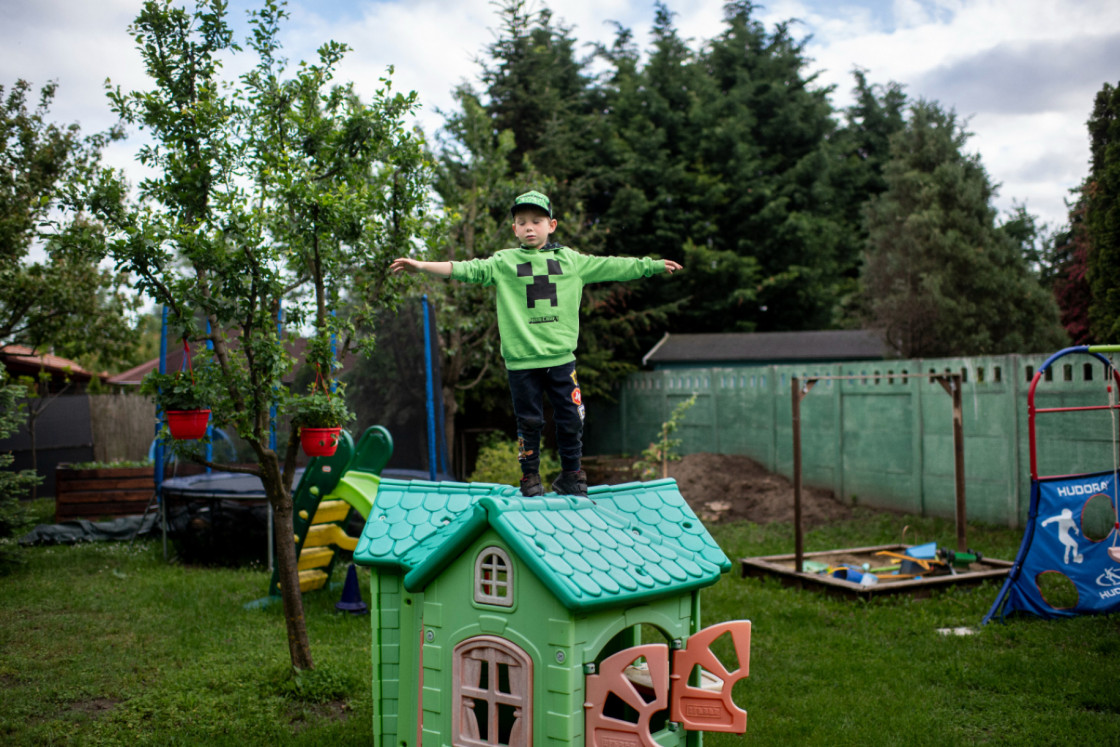
There are no official figures for how many pregnant women received oxygen, how many are on ventilators or how many Caesarean sections have been carried out to save the lives of foetuses and mothers with Covid. Neither the relevant ministry nor the National Health Care Service Centre collects statistics on this. Or so they say. Nor can you find out how many pregnant women have died during the pandemic but from time to time in the register of coronavirus victims, pregnancy is given as the pre-existing health condition. Gábor Biszak’s wife Erika, who was 31 weeks pregnant, was one of the victims. The doctors saved their third child by performing a Caesarean section last spring. Nimród, Johanna and Boróka are now growing up without a mother. The older two try to process what happened in their different ways. We spent eight months following the life of Gábor and his children. Translation by Charles Hebbert.
Four days after the death of his wife last April, in the third wave of the coronavirus pandemic Gábor Biszak sent us a message. He wrote after Telex had reported that for some reason pregnancy was given as a pre-existing health condition for an expecting mother who had died. He hoped that the same would be done for other pregnant women. „It is astonishing how insincere the government has been. It is considered non-news that 600 children have lost a parent, but suddenly János Áder, the country’s president, is setting up a foundation for them,” Gábor wrote.
Corresponding with him, we heard how he had lost — in his words — the love of his life, how his life had collapsed in just a few weeks and how he had been left on his own with three small children. He says that in the peaks of the pandemic the only people to see close-up what is happening in hospitals are the admitted patients. The only information the family gets about their relative’s real or suspected pre-existing health condition (which is said to have contributed to their death) is from the official register.
We spent eight months following the family. How did the father who had been the family bread-winner take on running the house as well in the space of a few weeks? How did he introduce order into the chaos? How did he cope with the loneliness he faced as the house went quiet each evening? And how much help did he in fact get from the foundation that was set up for children who lost parents or became orphans because of the pandemic?
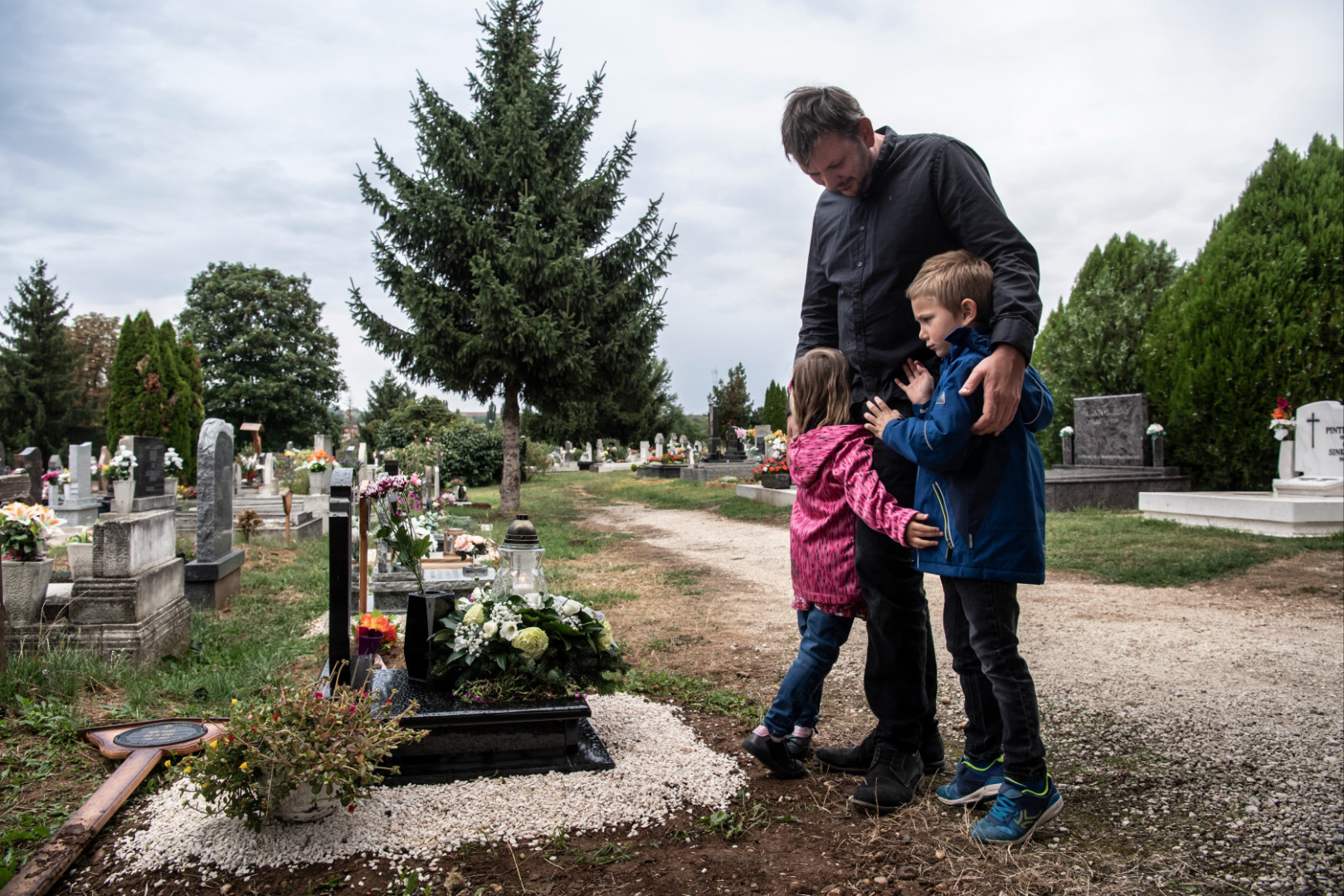
„Eri's birthday, Boti here: that was written on the calendar for tomorrow. But Boti is at the Balaton and Eri isn’t with us either” — ran the post that Gábor wrote on Facebook on 26 August last year. (Boti is his son from a previous relationship.) In his entry he adds that he doesn’t know how he should behave. He doesn’t want his wife’s birthday to be a day of mourning. So they will eat the blueberry muffins that Erika loved.
On 26 August the steaming muffins are there on the table and Nimród is stuffing a fourth one into his mouth. It’s beginning to drizzle outside but Gábor and the two elder children are going to the cemetery so the family can spend some time together, like people do on birthdays. Erika Petz would have been 36 that day.
Erika was 31 weeks pregnant when she caught Covid-19 last March. She and Gábor were expecting their third child. By 17 March her symptoms were serious enough for an ambulance to take her to hospital. She managed to persuade them to take her to Semmelweis University's Women’s Clinic. She knew that if the little girl was born prematurely she would be in good hands there. Two days later she wrote to Gábor: „Caesarean”. That was her last message. The doctors gave her a general anaesthetic because of the coronavirus, and on 19 March Boróka was born by Caesarean section. Erika never saw her.
While the doctors were struggling to save her, Gábor’s health worsened. On 22 March he was also admitted to hospital. Care had to be organised for 5-year-old Nimród and 3-year-old Johanna. Friends and relatives set up an Excel sheet during the lockdown for who was doing what and when.
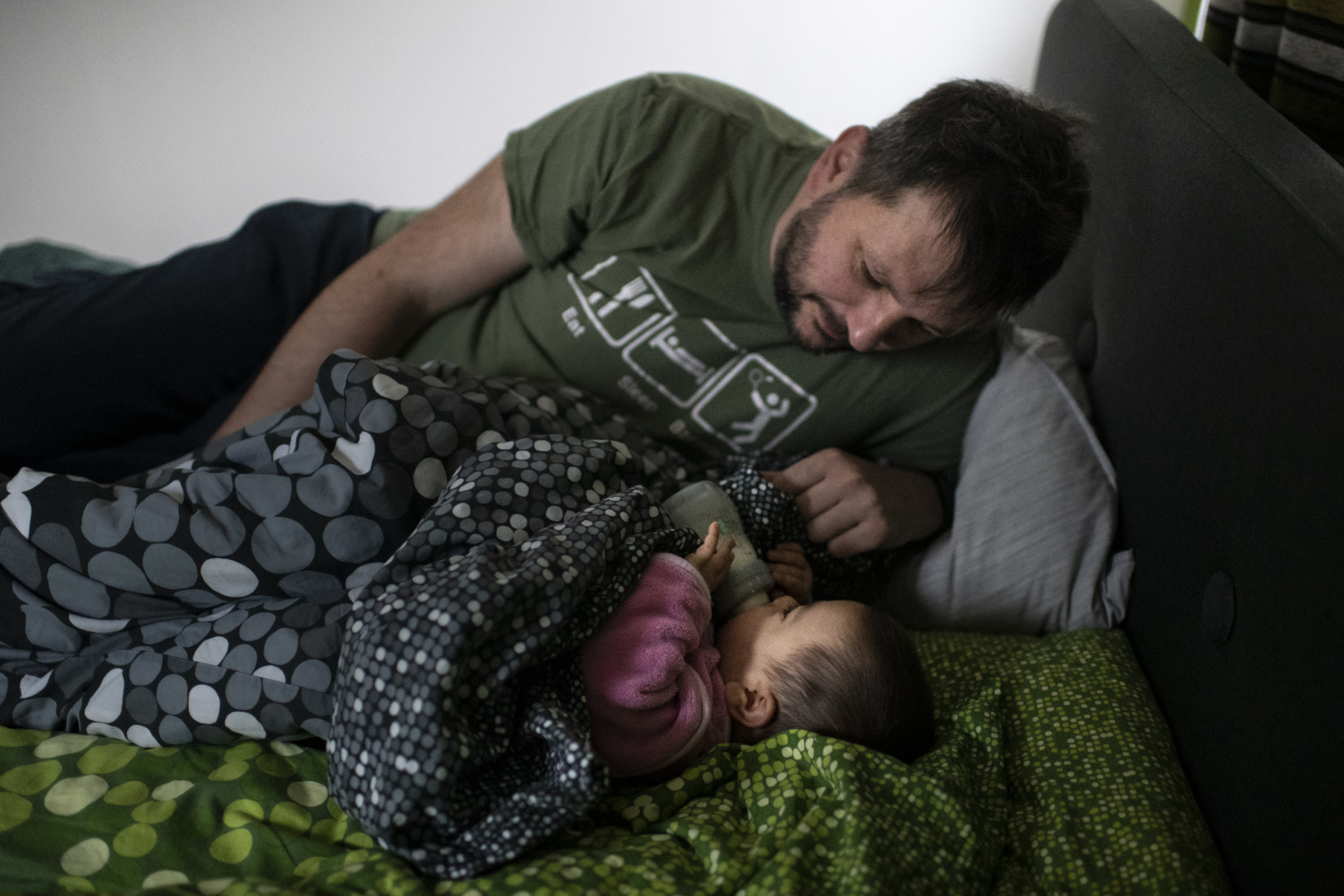
Gábor was allowed home after a week, while Erika was still in intensive care. After two weeks on a ventilator she was put on respiratory support but artificial respiration wasn’t working. On 16 April they rang Gábor and told him to come in to say goodbye to his wife. On 17 April they called to tell him: „Erika passed away.”
„You go out to the ambulance with her, you’re weak and a bit feverish, you hug each other, insofar as you have the strength to, but you can’t imagine that you’ve just hugged her for the last time,” Gábor recalls.
It is still not known how many other pregnant mothers have died of Covid in Hungary. There must be quite a few since the government finally took action last spring and began a special campaign to vaccinate pregnant women. That was two weeks after Gábor's wife died.
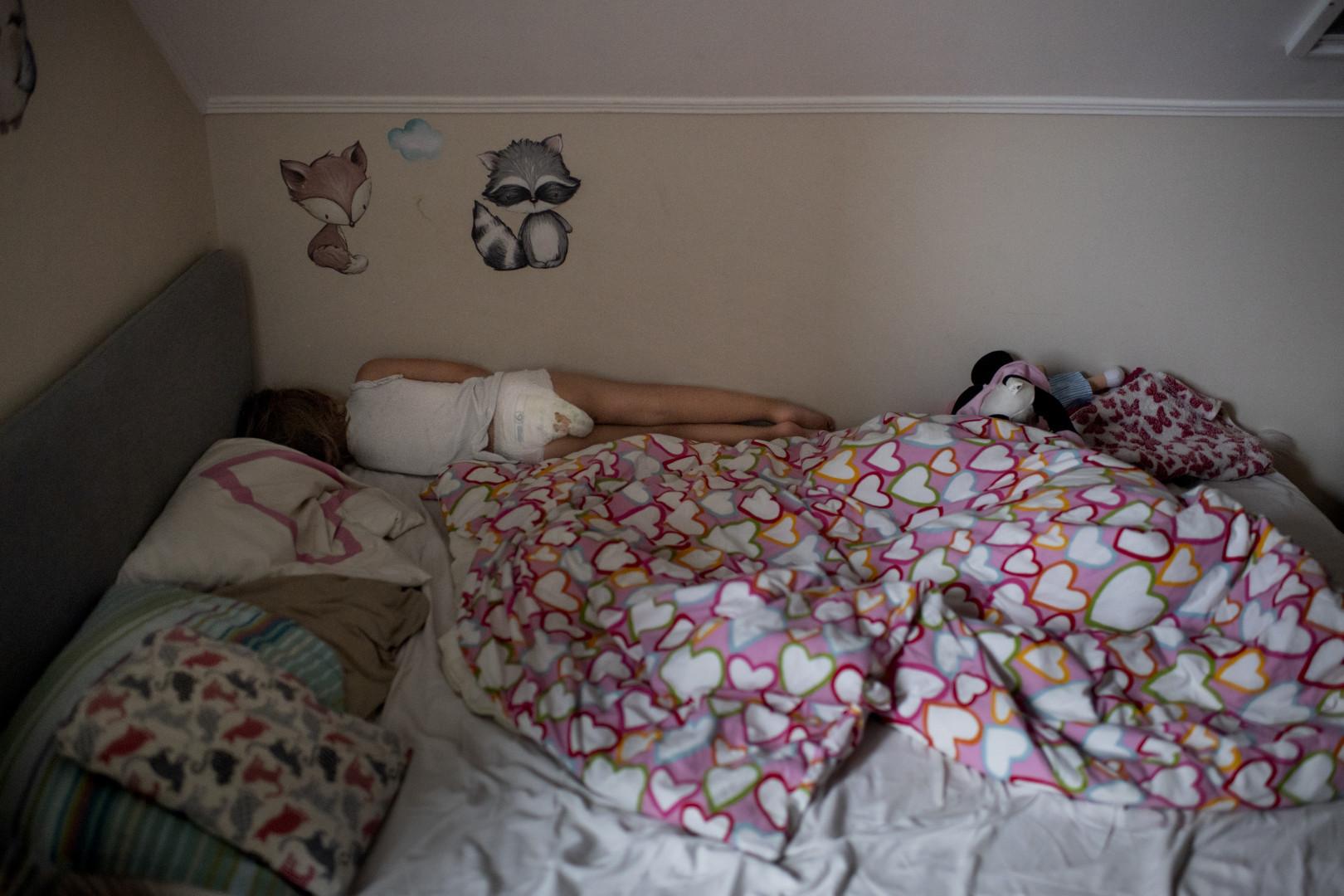
„When your life just falls apart you inevitably just let help happen. Otherwise you can’t survive,” says Gábor’s mother. Ilona came to Nagytarcsa from her home in Kaposvár, 200 km away, the day after Erika died to keep her son going and to help with the children. From one day to another she went from a classic grandmother role — appearing at special occasions and the odd weekend — to being one of the driving forces in the family.
At the age of 70, she was being the cleaner, surrogate mother and grandmother, all in one. She and her son would get up three or four times a night to feed the new-born baby and comfort the older ones when they woke. And she would handle the tantrums that burst out of the mourning children. She wasn’t physically tired, she said, but felt mentally shattered.
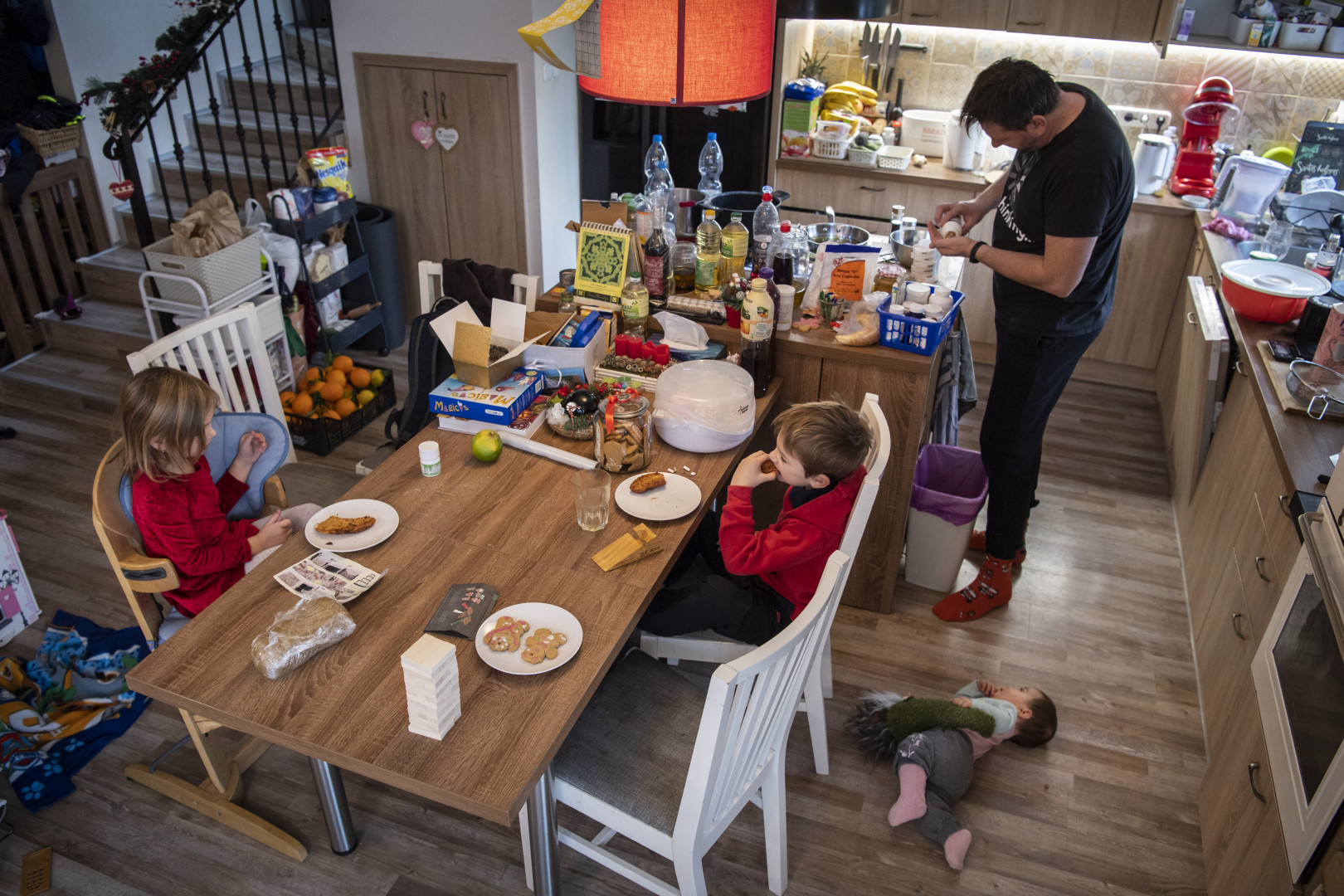
The post-natal educator, the doctor and the psychologist all told Gábor that this state of affairs could not go on forever. He knew this too. „I would rather pay for a cleaner and a babysitter so that the children have a grandmother who comes to collect them sometimes from the nursery and who they can visit at weekends or who comes to stay occasionally,” he said in August.
At the beginning of October they finally rented a flat in Nagytarcsa for his mother but she stays over occasionally to help out — more or less back in a classic grandmother role.
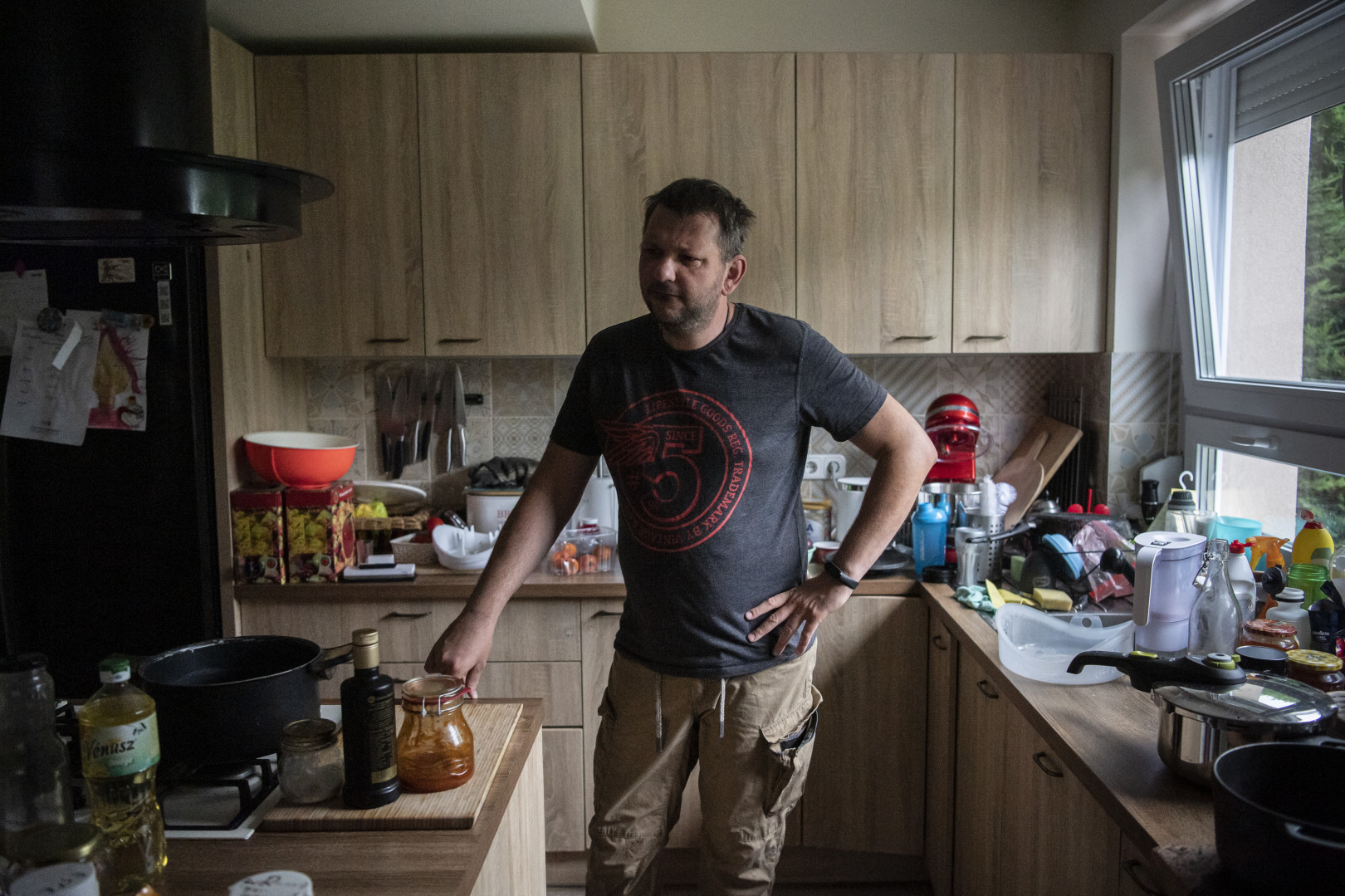
With his mother’s help he got rid of the double bed. He said that was part of the mourning process. „You need to be able to rest in a bedroom, but I just felt depressed when I lay down in the bed where we used to be together. I thought I have to change this, But I hate the bed I have now too.”
He has put away some of the photos of them together. „The past shouldn’t dominate the flat. We mustn’t stumble into memories at every turn because that just holds us back. We need more photos of our lives today, of Boróka instead. In due course I’ve got to clear out Erika’s clothes and her toiletries in the bathroom. Those all hinder the healing process as they reopen the very fresh wounds.”
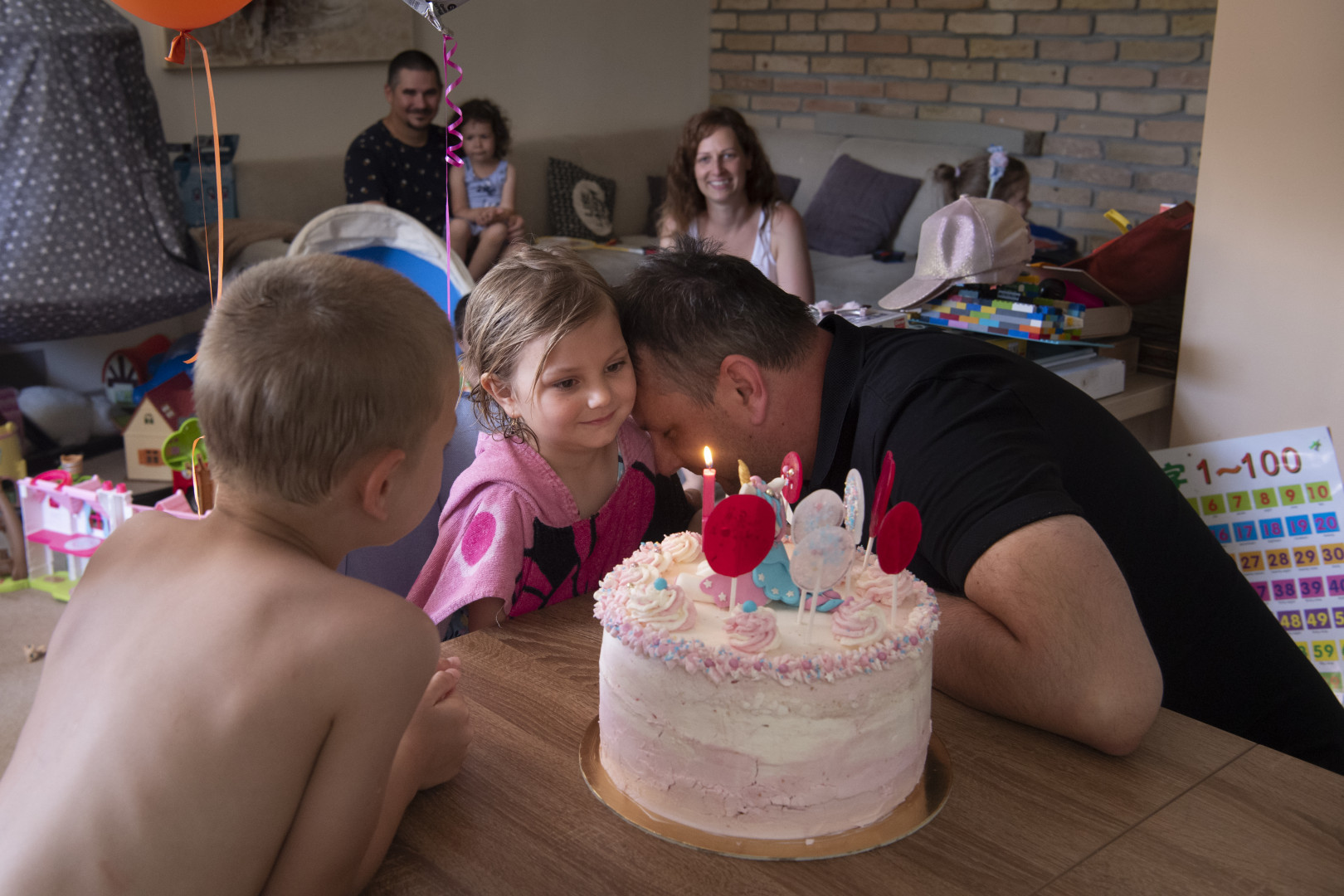
„At first you count the days and weeks that pass. Then all of a sudden you realise that eight months have passed,” Gábor says. In that time they have had the first big days „without her” There was the first Mother’s Day without Mum — in the nursery they didn’t celebrate it in Johanna and Nimród’s group because of the two children. Since then, Johanna has turned 4 and Nimród 6. In their different ways they both understand that their mum has died but are still processing the trauma.
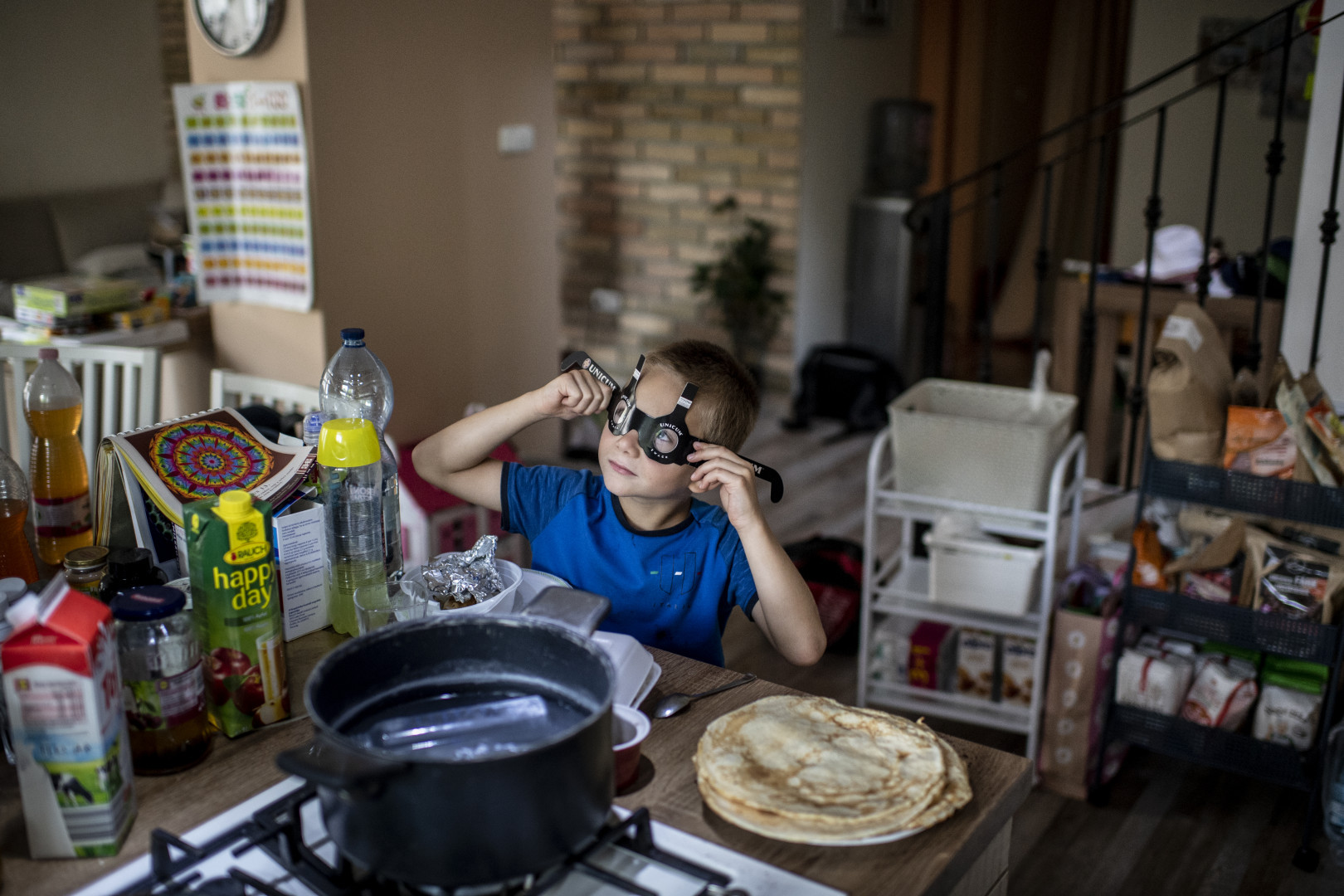
„In the beginning, Nimród put up a defence against it all. He would stay outside in the street as long as he could. He clearly did not want to come into the house. When he was inside he would constantly look at photos and cried a lot. In the nursery he hides and tries to make sure no one sees he is crying. He doesn’t like to talk about it because he knows it is emotionally troubling. And he is protecting me too,” says Gábor.
Nimród knows that his mother died from coronavirus, and at home he asks what can kill a healthy mother. He has also become aware of death — he asks „What will happen to us if Dad also dies?”
„Once I found him standing on the roof of the car. I asked him why he was there. He said: ‘I can do anything I want. Mum has died.’ But he doesn’t do that anymore.”
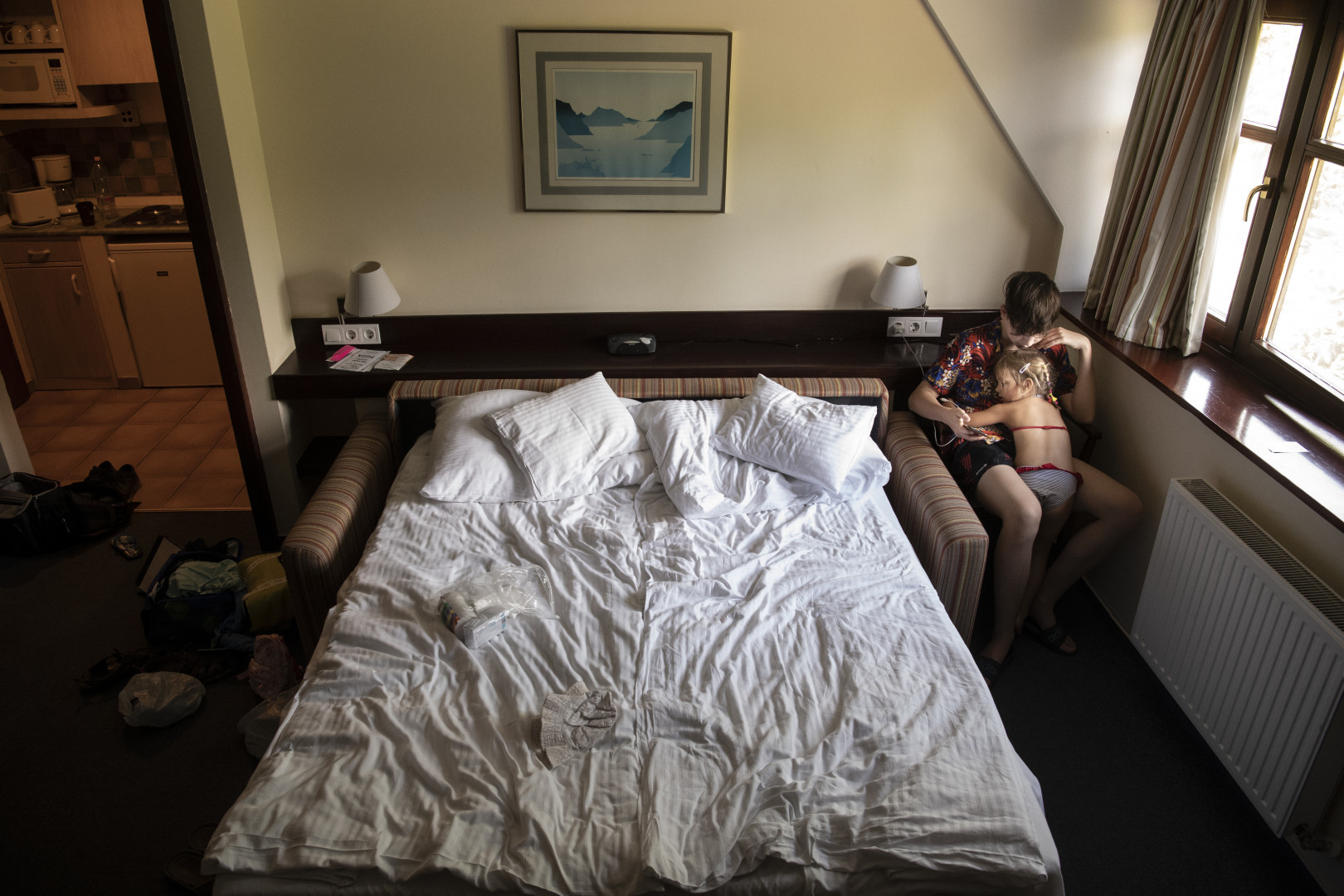
Nimród would try to escape from the nursery at first and would vent his anger aggressively, while Johanna tries to process the loss through playing.
„At the nursery, once she talked with a boy about what their mothers did. Johanna simply said that her mum had died. The boy asked what that meant. She said there was a funeral, her heart doesn’t beat any more and she is up in the sky and can see her from there.”
Nimród often looks at photos of his mother, while Johanna has memories that burst out. She sometimes says she has nightmares that her mother has died, but Gábor doesn’t know if that is true. „The psychologist says that by the time she goes to secondary school she will have forgotten a lot, only fragments of memories will remain. It’s very painful.”
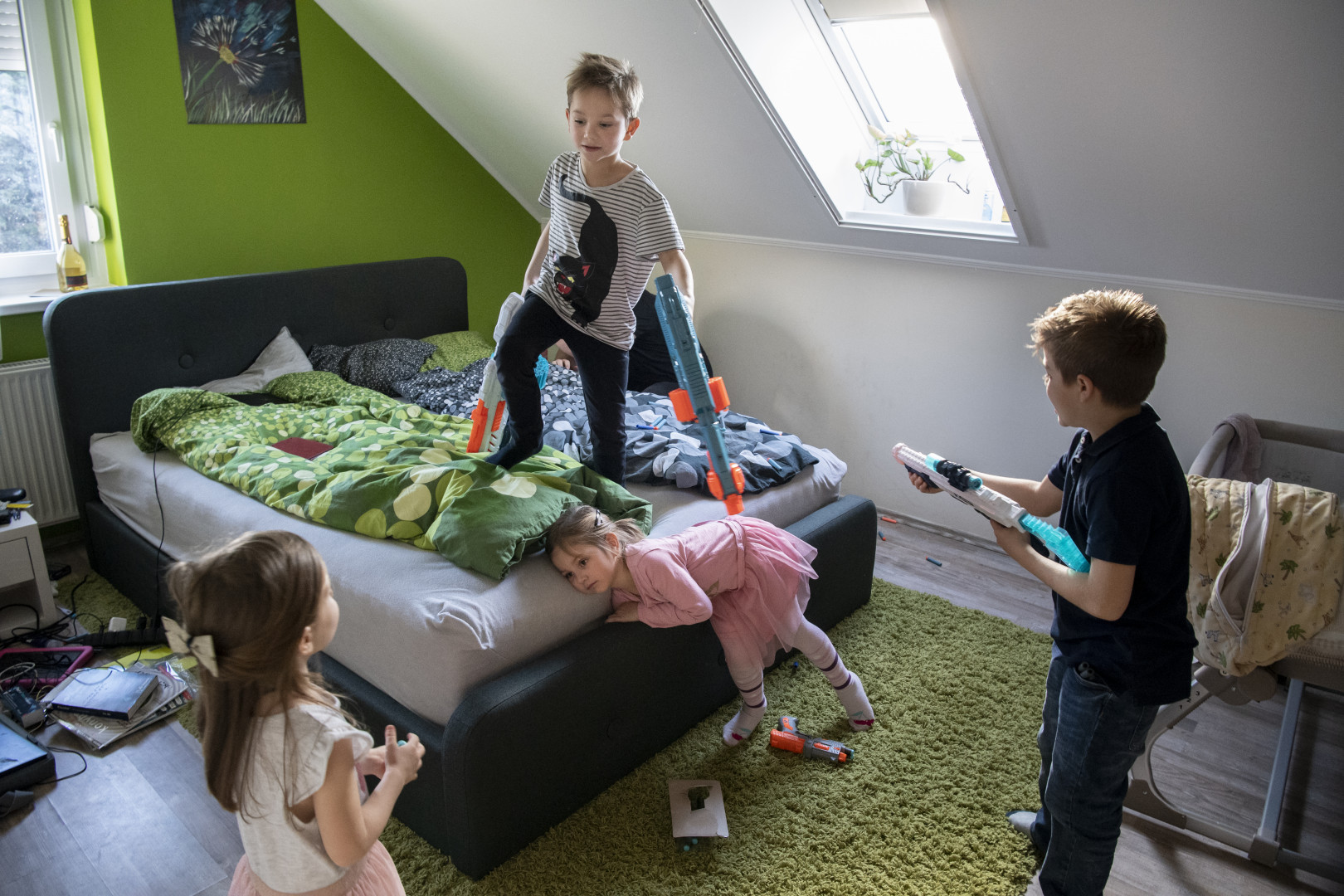
They often go to the cemetery together. The two children behave differently there.
„Nimród wept when we went to the cemetery on All Souls’ Day. If we go and I start crying, he says he would rather not come at all as he doesn’t want to see my crying. Johanna is more cheerful in the cemetery. She jumps about and plays hide and seek among the gravestones. She chats to her mother: ‘Hi, Mum, I’m well,’ and she tells her what has been happening. I take Boróka with me, it’s important that she connects to all this.”
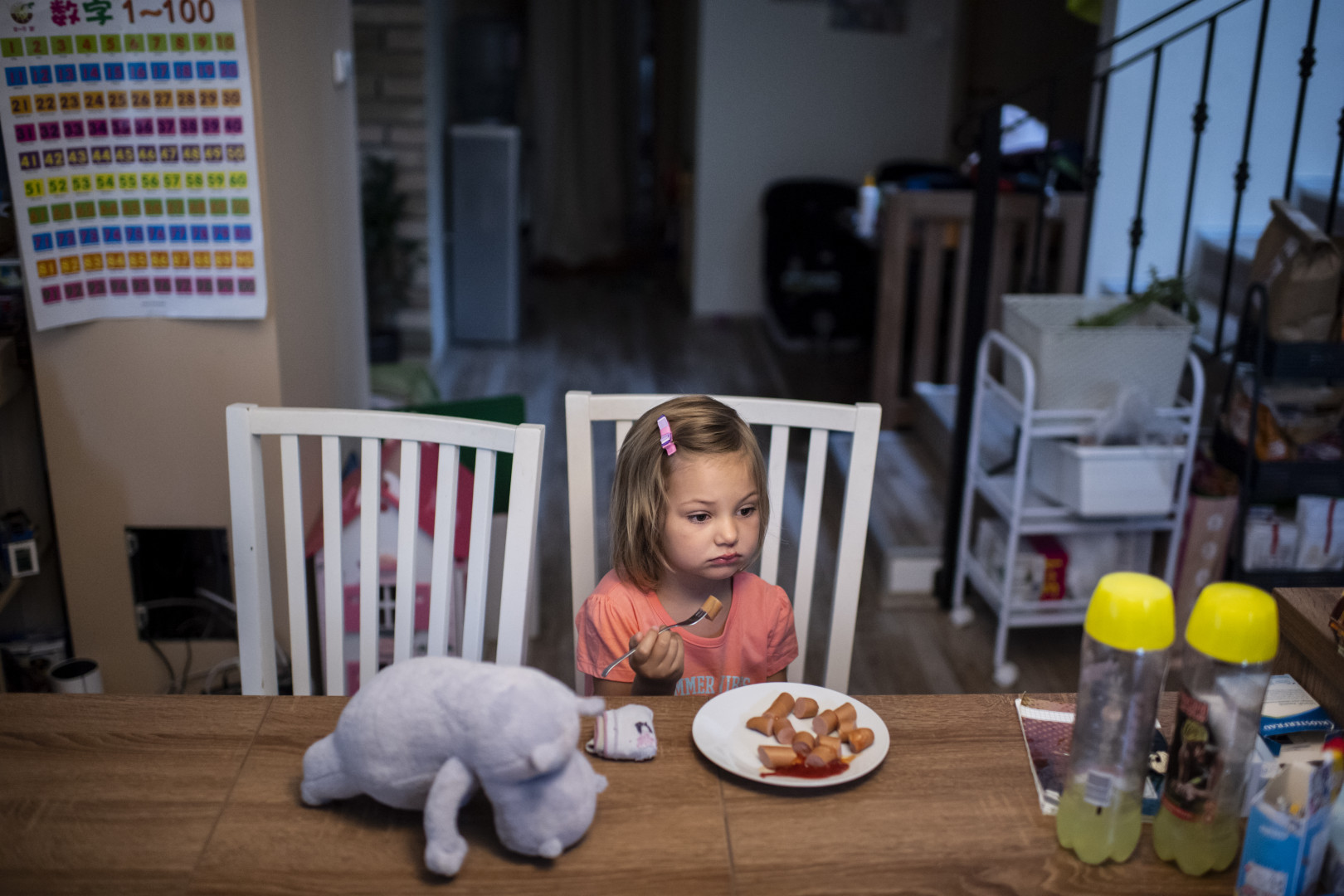
He says the children got over the initial shock by August, which helped them begin to adjust to a new life. It also helped Gábor to organise their lives on a totally different basis. He is a computer scientist working in a senior role. Before Erika died, they had classic division of labour. He worked, supporting the family, while she was at home with the children. She took them to the nursery and fetched them, she organised their activities and she ran the house.
After his wife’s death that all fell to Gábor. Alongside his work he had to sort out how to get the two older children to nursery and to their other activities, he had to take their prematurely born daughter to medical examinations. He also had to think about his older son from a previous relationship. In the first couple of weeks they ran a schedule for who would take the children when, but by August that gradually dropped off, and it was just the paid people: the babysitter and the cleaner who were left. And a school had to be chosen for Nimród.
„This was typically the kind of job I never did. It was always Erika who did that school stuff, and if she were here, it would have been sorted long ago. But now I’ve got to do it, so right now that is my main task.”
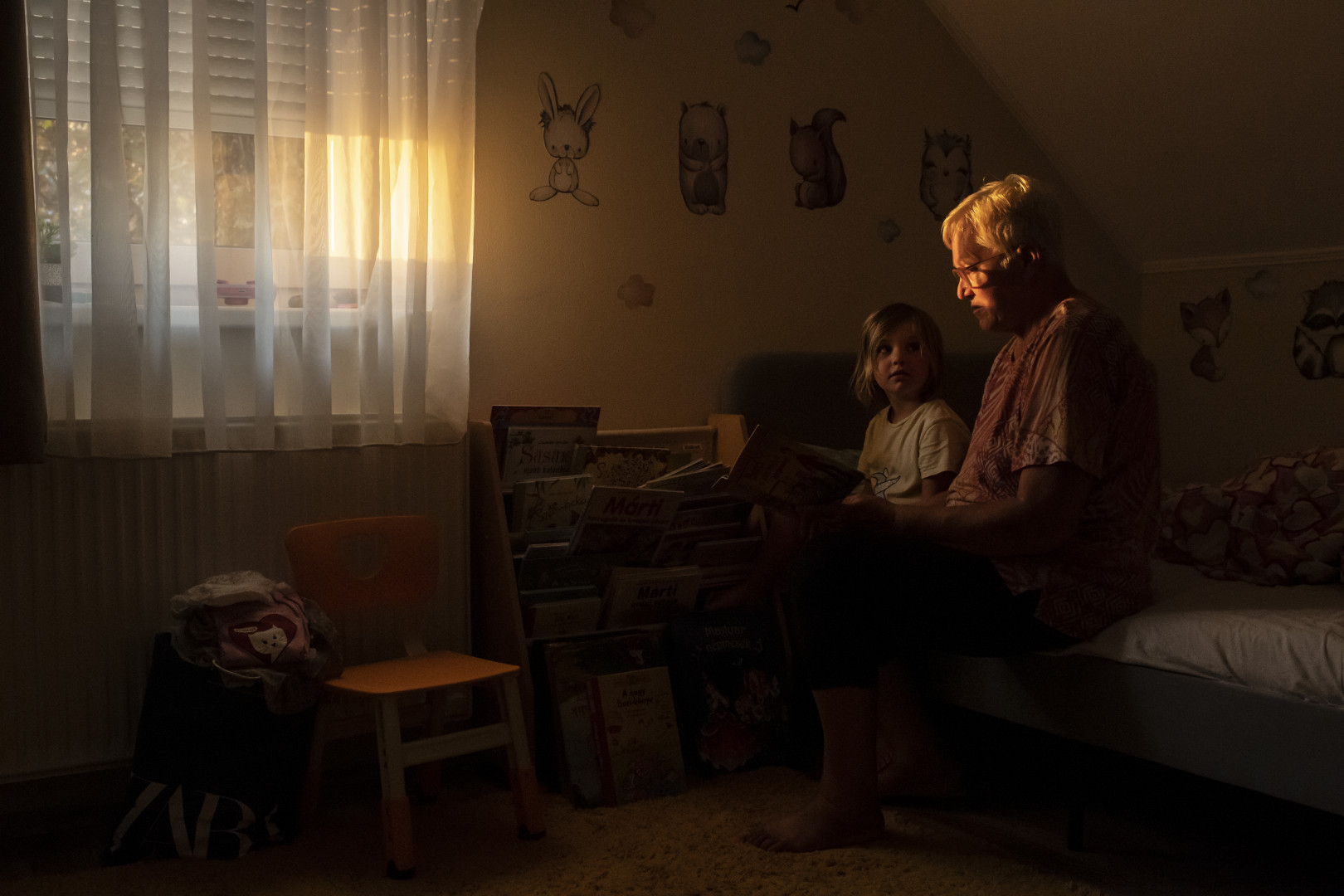
After Erika’s death it became more and more clear that some form of help was needed for the children, someone who was regular, who was always there. Judit appeared in the family’s life in March last year. She was a friend of a friend and they called her when it became clear that both Erika and Gábor were infected, and it was highly likely that the children were, too. Since she had already had Covid, she stepped in to help. She met Erika for three days. „By the third day I hardly saw her. She didn’t really come downstairs. I contacted her on the phone to ask if she wanted soup, which she didn’t.” When Erika was taken to hospital, she took time off work to help Gábor, and since then she has effectively become an integral part of the family.
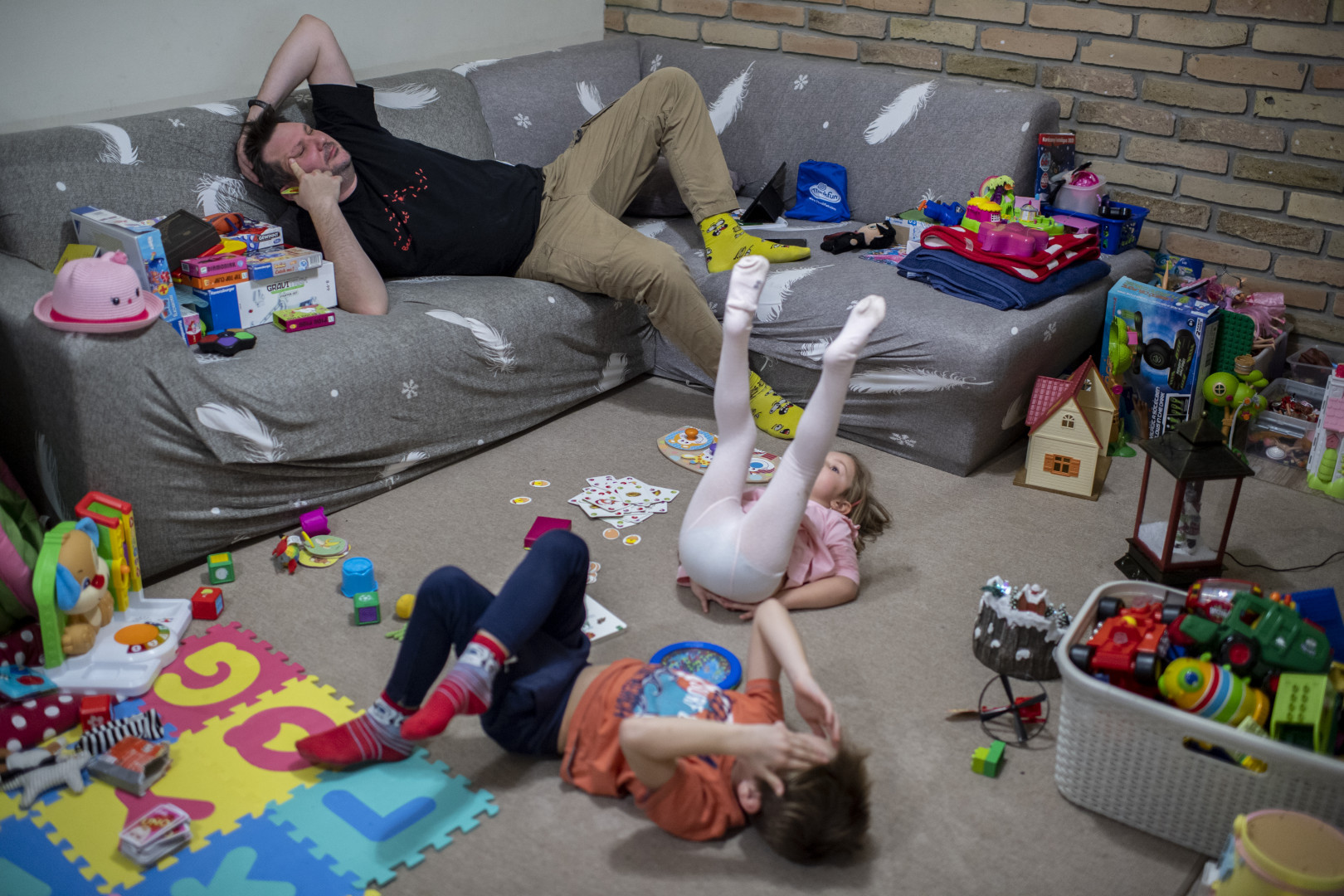
Judit left her old job and from September last year was employed by the charity that Gábor had set up to help children like his who had lost parents in the pandemic. He established the Erika Petz Charity to ensure continuous supervision for his children and to maintain their living standards. The charity trundles along with minimal support. So far, with one exception, other families in the same situation they have contacted have not asked for money. Gábor says that „without an office staff it is very hard to run the foundation, but at least it means that we have a good, registered babysitter”.
They tried to go through the Regőczi Foundation which János Áder, the country’s president, and his wife had set up to help orphans of the pandemic. Judit says that at first there was a promise of help and then an arrogant rejection. „I wrote to the foundation for assistance in setting up my legal status as an employee with the family. They wrote back that they would discuss the question at their next board meeting. They didn’t get back to me so I rang them up but they brushed me off quite arrogantly. They told me to find a job. I said that I have one, but to be able to work with the children I need to make it official.” In the end Gábor set up his own charity, and she works 40 hours a week through it.
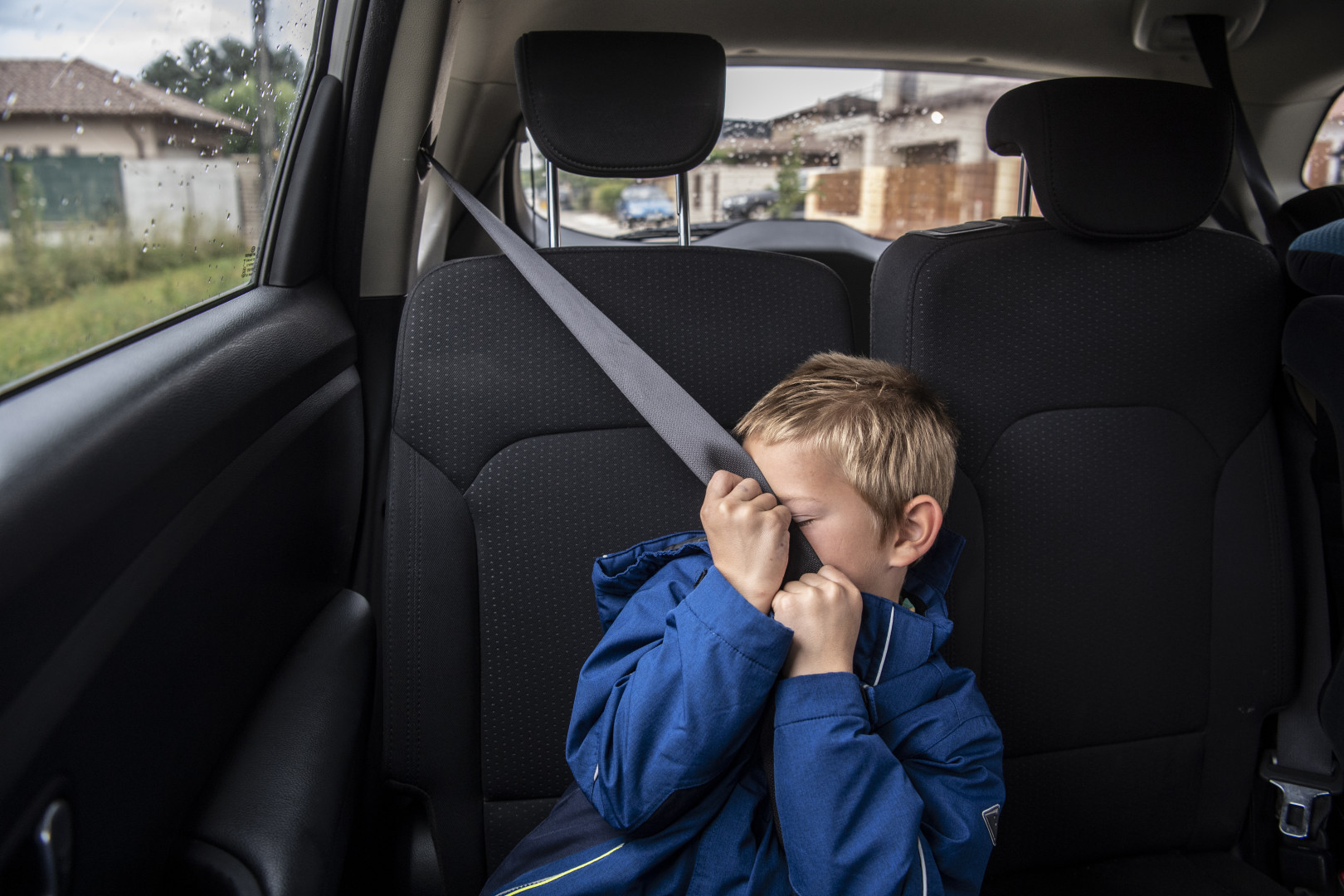
Gábor did receive support from the Regőczi Foundation, a one-off payment of 300,000 forints (£700) without any accompanying letter, and then at Christmas, 70,000 forints. The foundation’s secretary, Nándor Csepreghy, told Telex that there are 1,200-1,300 children in the country who lost one or both parents during the pandemic. That means about 600 families. Until December 2021, the foundation had received 400 million forints in donations from private donors and companies. They had so far given one-off payments of 200,000-300,000 forints to 711 children. In 2022 they plan to make payments for starting school, summer camps and Christmas and set up regular monthly payments to families, according to need.
Gábor aims for something similar with the Erika Petz Foundation, offering long-term personalised assistance.
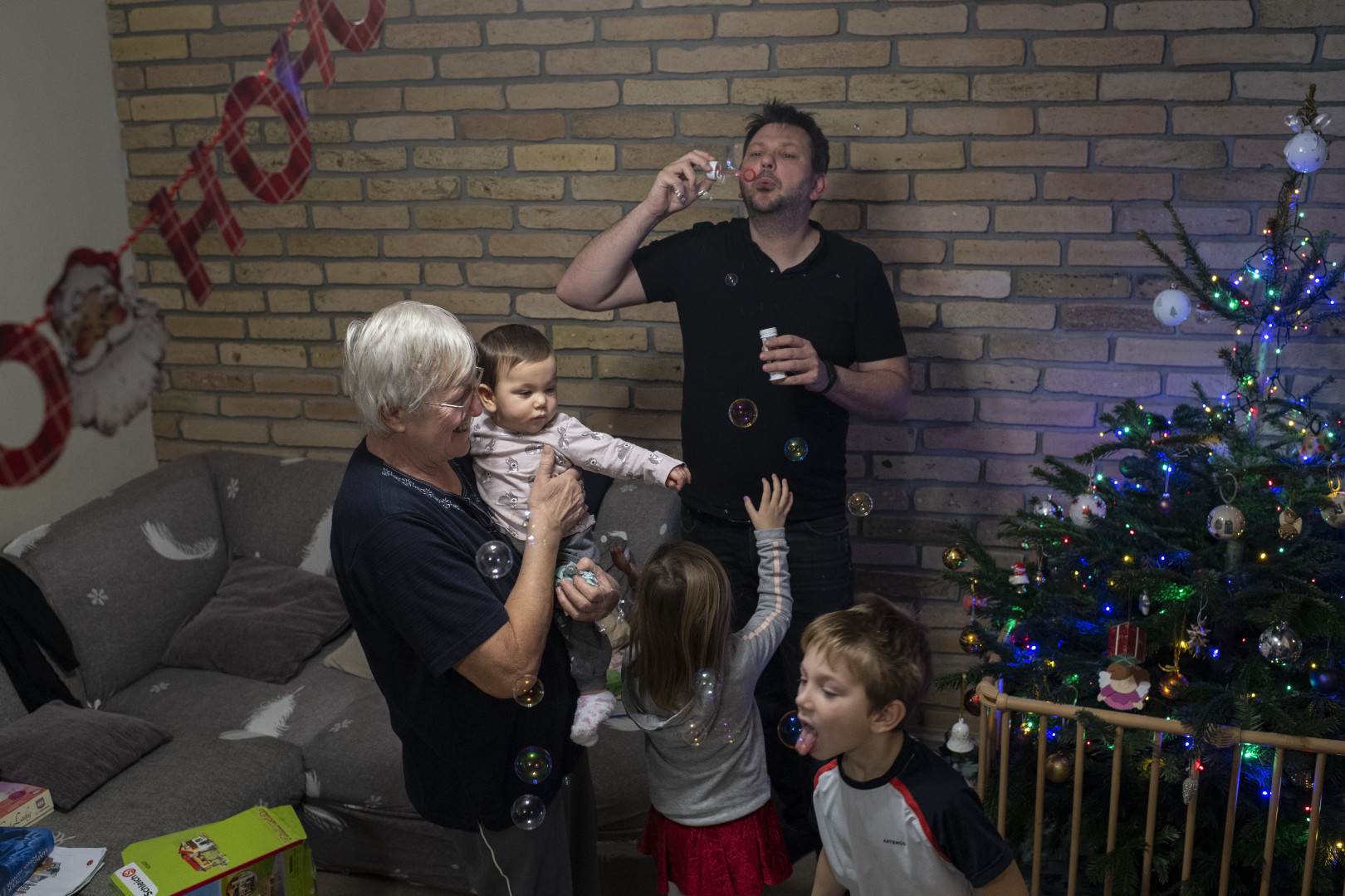
Last year was Boróka’s first Christmas, and the family’s first Christmas without Erika. Gábor said he had striven to ensure there was a festive atmosphere, „which is essential for the children, important for moving forward”.
„It’s important that we can be together at Christmas. Nimród and Johanna both said that all they wanted for Christmas was that their mother be alive. I said that they needed a plan B, as that wasn’t going to happen.”
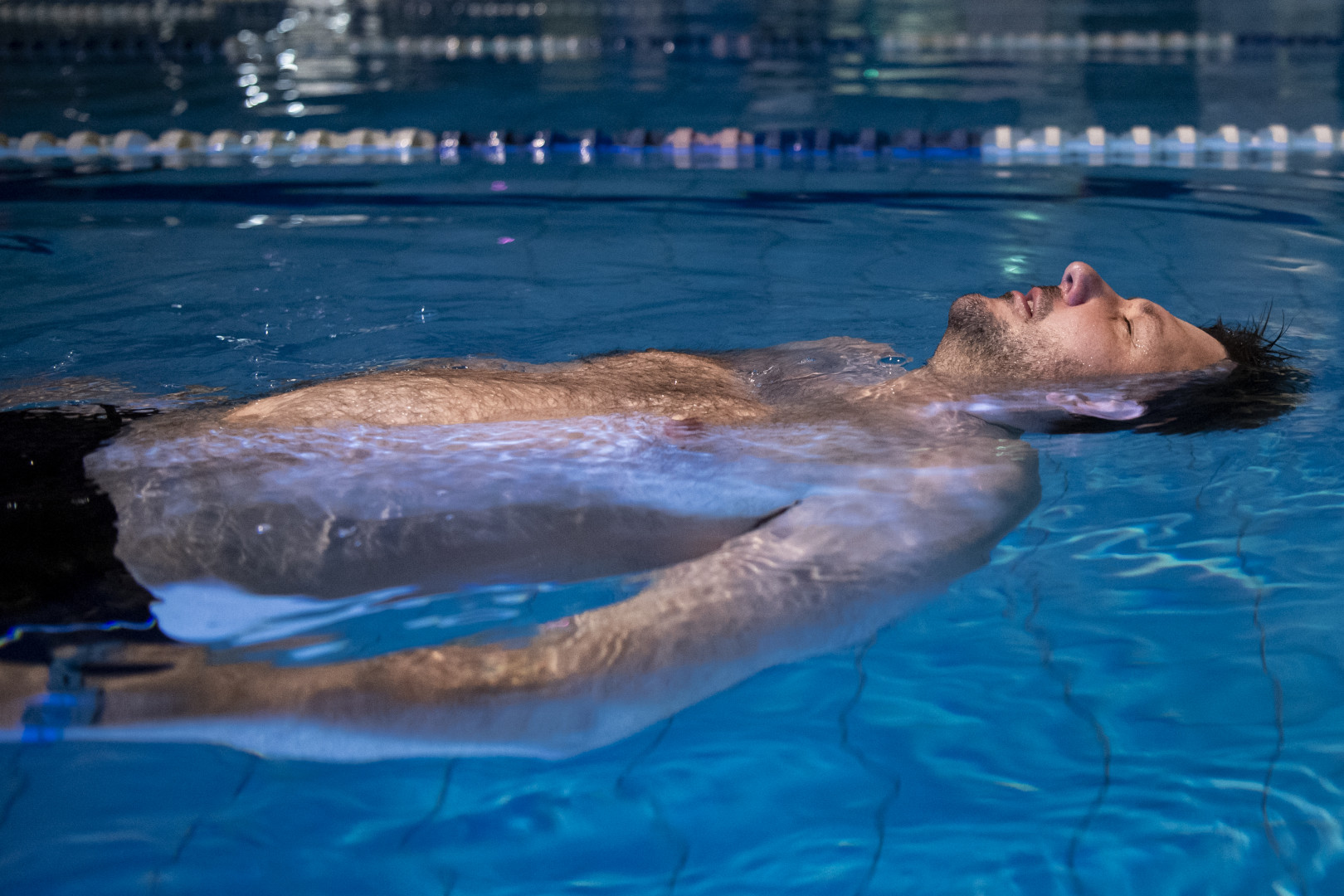
Come the winter, more than six months after Erika’s death, they had managed to establish a system in the family. Gábor takes the children to nursery and usually to their sporting activities. Nimród does something every day — swimming, badminton, climbing. During the day the babysitter and grandmother take turns, and at night either Ilona or her son put the children to bed. Gábor says they hardest thing now is „finding time and strength, as a parent left on his own, to look after himself a little”.